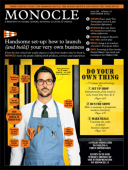
Issue 66
From the best schools for useful degrees to tips from leaders who’ve lived it, Monocle meets the people shifting fresh products, services and experiences.
In This Issue
Oops! No content was found.
Looks like we no longer have content for the page you're on. Perhaps try a search?
Return Home

